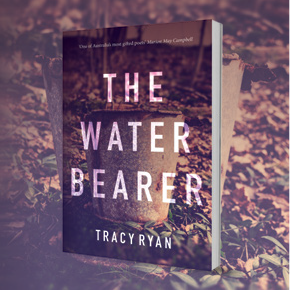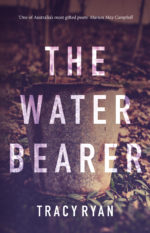Tracy Ryan on her new collection The Water Bearer

Acclaimed poet Tracy Ryan’s ninth poetry collection, The Water Bearer, is an intimate exploration of water and its many forms, from filling a second-hand cooler in an old country house to swimming lessons and ocean riptides. In this stunning volume, Ryan explores water as the life-giving and life-taking force that defines our existence.
Was there ever a moment you realised you wanted to be a poet, or do you feel that it was always a part of your identity?
I always loved poems (beginning with nursery rhymes!) – and wrote little rhymes when I was quite young. But when I first thought seriously of poetry was in my teens. Teachers are such vital influences on writers. Back in 1980, when I was 16, our literature teacher at school took us to a ‘moved reading’ of the poems on the upper school syllabus. Professional actors with minimal props and setting brought the poems of Judith Wright, Robert Browning and others to life. I just sat there realising poetry was something more powerful than I had understood from reading it on the page – and that this was what I wanted to do with my life.
The pieces in The Water Bearer seem very cohesive; did you write any of these with the collection in mind or did they all just come together?
At the core of the book was the idea of writing about what it’s like being on ‘self-supply’ – where you don’t have mains water, but live off your own source, whether that’s rainwater tanks, or bores, or both. It’s often romanticised but it’s actually very conflicted. The poems on that topic were at the heart of the book. Then as I continued to write, it always seemed to relate to the theme of water – even when the topic was something completely different. So perhaps the theme was at the back of my mind – but the rest arose from daily experience.
As a well-practised writer, do you consider writing poetry to be a comfort or a challenge, or does it depend on the subject?
Sometimes it’s a comfort, like when it helps you process something you couldn’t deal with in a better way. More often a challenge, because every poem falls short of what you imagined or conceived. To quote a poem by Judith Wright, ‘the ungathered alone stays beautiful/ and the best poem is the poem I never wrote’.
Is there any piece of advice you can offer aspiring young poets?
If you read or listen to lots of poetry without borders, and without limitation on the era it came from, and keep writing and sharing it by whatever means, you will become known. Good poetry is too treasured by those who love it for them to ignore or miss out on any new form it takes. What I mean is that all serious editors and book-buyers want to find great new stuff.
For writers the process of submitting work to journals, competitions and publishers can be daunting. How do you approach submitting work without being deterred by the possibility of rejection?
If you are deterred by the possibility of rejection, you should probably be doing something else. It’s a normal part of the process. You need to have self-belief and some stubbornness. As I said before, editors want to find great new poetry – that part is on your side. But of course you are dealing with the whole range of individual preferences that may not be on your side.
How do you write? Do you set goals and writing tasks for each day? Or do you rely on inspiration?
It varies depending on circumstances: a bit of both. At certain periods of my life I’ve had that sort of discipline, but then at other times I’ve had to wait for ideas and get them down when I could. At a minimum, I keep a journal as often as I can, and I think that is crucial for anyone who also wants the inspiration. It means your writing hand is always busy with something … you are still half-inhabiting the written world.



